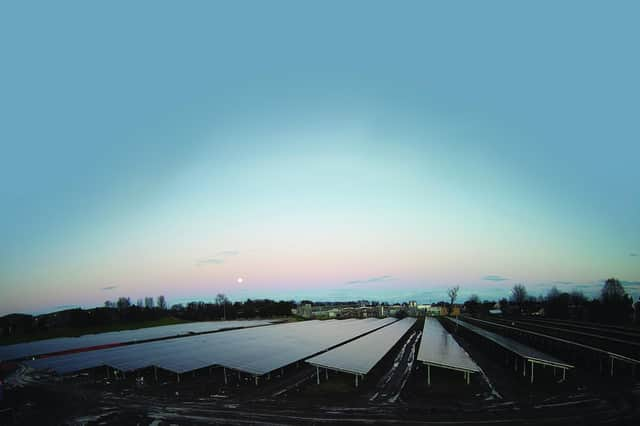How E.ON is helping whisky reach net zero


Energy company E.ON works with businesses across numerous sectors to help them achieve their sustainability ambitions.
In Scotland, a target of reaching net-zero emissions by 2045 has been set by the Scottish Government. And, with Scotch whisky being one of the country’s most important industries, producers in the sector are aware of their role in the switch to renewables.
E.ON has played its part in this transition, partly through its work with global drinks brand Diageo, the largest producer of Scotch whisky, including the world-renowned Johnnie Walker mark.
E.ON has partnered with Emtec energy to install 7,700 solar panels on a vacant patch of land at Diageo’s 150-acre plant in the Fife town of Leven. This vast solar farm provides renewable energy for the site, generating 22 per cent of its annual electricity needs, rising to 60 per cent during the summer months, and it saves some 850 tonnes of carbon.
The Diageo project is just one example of E.ON’s wide portfolio of net-zero partnerships. The energy group operates in around15 countries across Europe, has almost 80,000 employees, and a strong client base in food and beverage manufacturing.
E.ON is helping Edinburgh Zoo with sustainability by building a 1MW solar array to power the site from a 5000m2 solar meadow. On Skye, it has been involved in a Resilience as a Service (RaaS) project in partnership with Scottish and Southern Electricity Networks Distribution and Costain to deliver an Ofgem-backed battery solution to improve security of supply.
Simon Duncan, director of B2B Solutions at E.ON, says: “We’re technology agnostic, providing a suite of solutions. What we offer is bespoke and tailor-made, depending on our customers’ goals, such as energy security and resilience or reduced costs.
“We will typically take customers on a journey through what we call ‘visualise, optimise, decarbonise’.”
He explains that the process starts with helping customers understand what energy they are using so E.ON can implement its solutions to improve efficiency.
The customer can then make capital-based decisions on what renewable technologies to adopt. They may look at solar, heat pumps, and a number of different heating, ventilation and cooling solutions, and re-using waste heat – whatever is best suited to their needs.
“We offer funding solutions for our customers and help find grants and schemes that support innovation in their industry,” adds Duncan. “There are clever things like power purchase agreements which allow customers to offload the responsibility and the risk of managing their energy assets, where E.ON can own and safely operate and maintain them for you.”
Looking at the sustainability challenges faced by many organisations, including Scotch whisky firms, Duncan maintains one is simply knowing where to start. E.ON can come in to help customers create a workable net-zero plan. He explains: “There are a few things that are common challenges to decarbonisation, and site disruption is one. A lot of sites will operate 24/7 and we can work around that.
“In some cases, we’ll introduce innovative options such as setting up power elsewhere to avoid disruption. Most organisations have got real specialisms, but energy won’t be one of them, so we’ll bring our world-class expertise.”
E.ON can, for example, help address connectivity and grid capacity issues by implementing smart solutions to make sure the network can cope and by optimising the likes of solar or battery power assets.
Turning to opportunities for Scotch whisky companies, and other business customers, Duncan observes there are several benefits, including saving energy and cutting costs. By investing in decarbonisation solutions, customers are also protecting themselves against price volatility in the market.
He adds: “Our solutions offer security and resilience benefits to businesses, as well giving them options of where they draw power.
"Depending on the solution, companies can earn money from their energy generation. Storing energy or exporting it to where it’s of higher value to the grid can be a great money earner.
“Then there are benefits to the local community, including improvements in air quality, by moving away from fossil fuels, and to the wider planet. This can be a real brand differentiator when people are purchasing whisky and want to understand how the business operates and its plans around social responsibility and sustainability.”
Duncan is fully confident that E.ON can draw on its wide-ranging experience accumulated through years of success to continue to support the Scottish whisky industry in its journey to net-zero.
“We have the connections and the buying power to collaborate with the very best organisations in Europe,” he concludes.
Delivering on net-zero commitments
As part of Diageo’s Society 2030 commitment, they aim to be carbon neutral by that year, having already reduced their operational carbon emissions by 50 per cent.
This commercial solar project supports their ambitious ten-year sustainability action plan and they’ve even commissioned a new mural at the Leven site, designed to publicly reinforce its commitment to reducing its environmental impact.
E.ON is continuing to support Diageo with additional energy efficiency solutions projects that support our mutual drive for a more sustainable future.
Stuart Beasley, a director at E.ON, says: “We have decades of experience in delivering affordable and sustainable solutions that help businesses reduce their carbon emissions.
“With our partners, Emtec, we’re ideally placed to help Diageo in their ambitions to create a more sustainable business, as well as showing employees and customers the tangible changes they are making in the face of the climate emergency.”
Find out more at https://www.eonenergy.com/